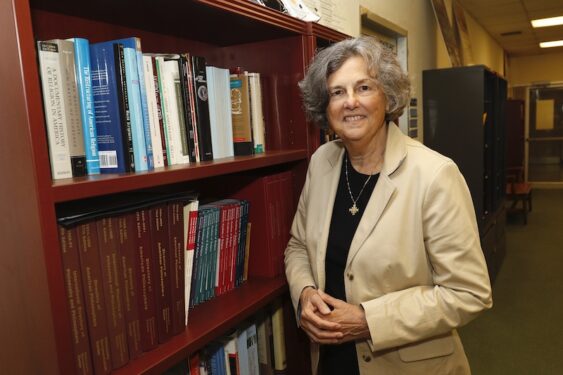
PROSPECT HEIGHTS — One of the nation’s foremost champions for the cause of female deacons considers the Vatican’s new apostolic constitution — which in part opens top Vatican leadership roles to any baptized layperson, including women — an important step for Pope Francis’ vision, but not necessarily one that affects the future of women in the diaconate.
“I think you need to distinguish between management and ministry,” Phyllis Zagano, an adjunct professor of religion at Hofstra University, and author of the new book Women Religious, Women Deacons: Questions and Answers told The Tablet. “Ministry would be the diaconate. It’s not exactly apples and oranges, but it’s close.”
Pope Francis published the new apostolic constitution titled Praedicate evangelium, or “Preach the Gospel,” on March 19. The document stipulates that “any member of the faithful can head a department or organism” at the discretion of the pontiff, acknowledging that the church’s evangelizers extend beyond the pope, bishops, and other ordained ministers.
Zagano, who served on the Papal Commission for the Study of Women in the Diaconate that convened in 2016, is skeptical of the influence and governance ability lay people in these roles will have. She said staff positions in the Roman Curia “are positions where, at the very most, governance is delegated but it’s not governance held by an individual.”
“So if a woman is the prefect of the Congregation of the Doctrine of the Faith I don’t believe she actually wields governance, but she is acting as a staff person for the Holy Father,” Zagano said.
“I think the Holy Father has struck the right note by starting with staff to include women, give them more space, but in my meditation on it, I really see that he’s not aggregating it at all, that lay people will still be cooperating, not having governance and jurisdiction with this, not that it’s not important,” Zagano continued.
As part of the other changes in the new apostolic constitution the top three Vatican departments, now called “dicasteries” under the new curial structure, are in order: Evangelization, the Congregation for the Doctrine of the Faith (CDF), and the Service of Charity.
Zagano describes the order, particularly with Evangelization above the CDF, as the conflict between the law and the prophets, of which she argues (while acknowledging both are needed) that “the Holy Father has placed the prophets above the law at this point.” And that emphasis on evangelization and prophets is part of the reason Zagano holds that the Church should allow women in the diaconate.
“This new document speaks to the need for women to be deacons because that’s what deacons do: They preach the gospel,” Zagano said. “If nothing else, it’s the word, liturgy, and charity which women in certain areas of the world do that presents the need for women deacons.”
Zagano notes that what would be interpreted as diaconal functions of the church — hospitals, schools, nursing homes, sections of social service agencies — are managed and invented by women, run by women, and funded by women. Therefore, she said it’s important to connect those carrying out different ministries at these locations with the “proclamation of the gospel.”
“I want to hear them on Sunday, but I can’t. It’s absolutely illegal,” Zagano said, acknowledging that the only person who can preach the gospel in a public celebration of the Eucharist on a Sunday is a cleric.
“We’re talking here about community. So the sister who is working in the soup kitchen and is known to the people in the community, I want once in a while to hear her talk about what she feels the gospel is saying to that community,” she continued. “Whether they’re talking in Church or talking to you over coffee they’re going to be talking about the gospel.”
Zagano also noted the significance of the image of a woman participating in the liturgy.
“To see a woman participating in the liturgy; to see a woman proclaiming the gospel let alone preaching and vested would enhance our own respect for women worldwide,” Zagano said.
